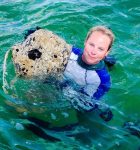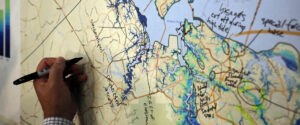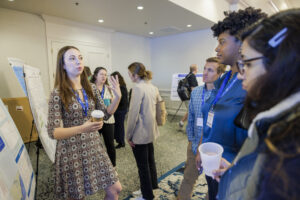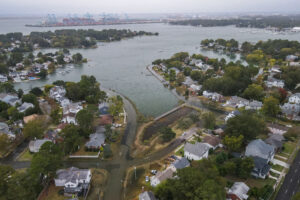Above left to right: Ali Burgos, Clayton Cope, Sophie Godfrey-McKee, Chase Long, Kelley Uhlig, and Marla Valentine.
2022 Knauss Fellowship Finalists Announced
Virginia Sea Grant is pleased to announce the six 2019 finalists for the John A. Knauss Marine Policy Fellowship program. Four students from Virginian institutions and two from Washington, D.C. institutions have been chosen for this prestigious fellowship, named for one of Sea Grant’s founders and former National Oceanic and Atmospheric Administration (NOAA) administrator. Each class of Knauss fellows is an impressive group with diverse backgrounds and interests. This year’s class of 66 talented early-career professionals, represent 30 of the 33 Sea Grant programs, and will be the 40th class since the program began in 1979, taking the number of Knauss fellows to over 1,300.
“The Knauss Fellowship is an incredible educational and professional experience for graduate students who are interested in the interface of science and policy. Virginia Sea Grant is proud to be able to support talented and highly-motivated applicants from across the Commonwealth each year. All six of the 2019 finalists have a strong passion for coastal communities and ecosystems and are eager to learn first-hand how science can inform policy. The opportunities and experiences they have as Knauss Fellows will help prepare them to be future leaders in our communities, and we are looking forward to seeing where they are in the years to come and the impact they will have.” says Virginia Sea Grant’s Fellowship and Research Program Coordinator, Dr. Sam Lake.
Knauss finalists are chosen through a competitive process that includes several rounds of review. If applicants are successful at the state Sea Grant program level, their applications are then reviewed by a national panel of experts. This fall, the 2019 finalists will travel to Washington, D.C. to interview with several executive or legislative offices. Following placement, they will begin their fellowship in February 2019. The John A. Knauss Marine Policy Fellowship is a unique opportunity for exceptional graduate students to expand their educational and professional experience with national marine policy in the District of Columbia.
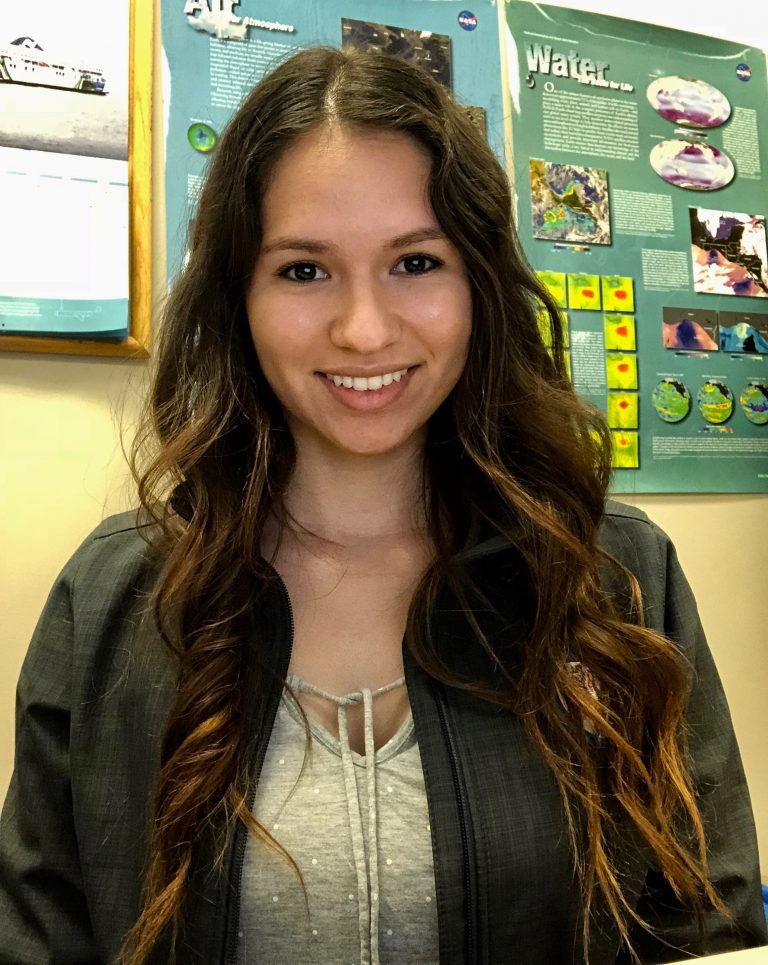
Ali Burgos graduated from Rutgers University in 2016 with a Bachelor of Science in Meteorology. She trained to become a weather broadcaster but ultimately chose to pursue a Master’s degree with a concentration in Physical Oceanography at Old Dominion University. Her research allowed her to study several aspects of sea level rise that introduced her to the field of public policy. She witnessed the destruction from Hurricane Sandy when it hit NJ in 2012, and her family in Puerto Rico faced the catastrophe caused by Hurricane Maria in 2017. These storms instilled a deep desire for her to help coastal communities confronted with climate change impacts such as sea level rise and increased storm frequency and severity. As a Knauss fellow, Ali hopes that she will learn more about integrating scientific findings into effective coastal management policies. When not coding in MATLAB, Ali can be found rock climbing or knitting.
Clayton Cope graduated from the University of Virginia in 2013 with Bachelor of Arts degrees in Environmental Science and Environmental Thought and Practice, and in 2014 with a Master’s degree in Environmental Science. His thesis focused on phosphorus treatment in wastewater plants and analyzed the ability of Virginia wastewater plants to meet phosphorus discharge levels for the Chesapeake Bay. Recently, Clayton graduated from the George Washington Law School with a Doctor of Jurisprudence degree focused in environmental law. As a native of Virginia, Clayton is excited to work with NOAA to protect Virginia’s coastline and help communicate science to policymakers.
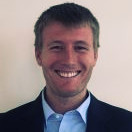
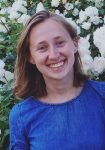
Sophie Godfrey-McKee graduated from The George Washington University in 2013 with a Bachelor of Arts in International Affairs with a concentration in International Environmental Resources. In 2018, she completed a Master of Public Policy focusing on Environmental Policy & Law and Data Analysis. Before beginning her graduate degree, Sophie spent three years in the Office of Research and Development at the U.S. Environmental Protection Agency supporting several interagency initiatives piloting new approaches to reducing nutrient pollution in the Chesapeake Bay and incentivizing development of next-generation water sensing technology. In her career, Sophie hopes to apply her experience with environmental impact assessment, developed through an internship at the Council on Environmental Quality, to assist governments in evaluating the environmental impacts of policy decisions on critical marine and coastal ecosystems.
Chase Long, graduated from the University of North Florida in 2013 with a Bachelor of Science in Coastal Biology. Currently, his research at the Virginia Institute of Marine Science examines the early life history characteristics of the ocean quahog. His work seeks to fill in knowledge gaps surrounding this species’ growth and reproduction with the goal of providing sound science to managers of the ocean quahog fishery. Chase originally became interested in the science-policy interface through his interactions with federal researchers at NMFS-NOAA Northeast Fisheries Science Center, stakeholders at Science Center for Marine Fisheries meetings, and other scientists. His research experience has stoked his enthusiasm for a career in marine science and shown the importance of communicating scientific findings to stakeholders and policymakers to serve the needs of the public. Chase hopes that a Knauss Fellowship will provide him with the experience necessary to integrate the strongest science available with the needs of legislators and stakeholders to best serve the public interest.
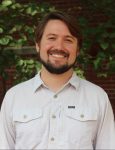
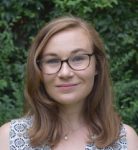
Kelley Uhlig graduated in 2013 with a Bachelor of Science in Chemistry from the University of North Florida. During a gap year spent hiking the Appalachian Trail, Kelley’s passion became clear and led her towards marine environmental contamination and marine debris. She will finish her Master’s degree in Marine Science at the Virginia Institute of Marine Science in the fall of 2018. Her research investigates chemical contaminant adsorption to marine microplastic debris and the early microbial communities that colonize these plastics. Particularly, she is interested in alternative plastic materials that can degrade quickly in marine environments. Kelley is also passionate about giving back to her community and has led several volunteer efforts to clean up local waterways and educate students about marine debris issues. Her interest in policy stems from her work with local government officials to provide shoreline clean-up data and participation in breakout sessions during the second Virginia Marine Debris Summit. As a Knauss Fellow, Kelley hopes to learn more about how scientists can contribute to important policy decisions and what policymakers need from scientists in order to make sound decisions about the marine environment.
Marla Valentine graduated from Salem College in 2009 with a Bachelor of Science in Biology with a concentration in Chemistry. She completed a Master of Science degree in Oceanography at Louisiana State University in 2013 that focused on deep-sea benthic ecology using ROVs following the Deepwater Horizon Incident. Marla worked hand-in-hand with both industry and government agencies to assess demographic changes in deep-sea fishes and invertebrates. Currently, Marla is finishing her doctorate at Old Dominion University, where she was awarded a Dominion Scholarship to support her research on the effects of sponges on nutrient dynamics in coastal marine ecosystems, specifically in the Florida Keys. Between degrees, Marla worked for several marine research labs from Alabama to Delaware to Alaska. Given her passion for restoration work, she hopes this Knauss Fellowship will further her understanding of the interaction between science and policymaking.
